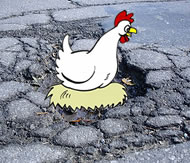Ta mee nane as daeed bleeaney d’eash jiu, as ta my voir ayns Bangor yn jerrey shiaghtin shoh. Hie shin dys cuirrey kiaull yindyssagh riyr; dee shin kirbyl ayns thie lhionney ynnydagh jiu, as hemmayd dys cuirrey kiaull elley noght. Ghow mee arrane ayns yn cuirrey kiaull riyr rish yn sheshaght chiaullee cohellooderys Bangor, agh bee mee ayns yn lught eaishtagh noght.
Breithlá
Tá mé daichead a haon bliain d’aois inniu, agus tá mo mháthair anseo i mBangor an deireadh seachtaine seo. Chuaigh muid chuig ceolchoirm iontach aréir; d’ith muid lón i dteach tábhairne áitiúil inniu, agus beidh muid ag dhul chuig ceolchoirm eile anocht. Chan mé sa ceolchoirm aréir leis an cóir pobail Bangor, ach beidh mé sa lucht éisteachta anocht.
Penblwydd
Dw i’n pedwar deg un blwydd oed heddiw, ac mae fy mam yma ym Mangor y penwythnos ‘ma. Mi aethon ni i gyngerdd wych neithiwr; mi fwyton ni ginio yn nhafarn leol heddiw, ac mi awn ni i gyngerdd arall heno. Mi ganes i yn y gyngerdd neithiwr gyda’r côr cymunedol Bangor, ond bydda i yn y cynulleidfa heno.
